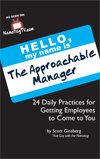 So, I have this running list of about 4000 questions.
So, I have this running list of about 4000 questions.
Questions to ask yourself.
Questions to ask your team.
Questions to ask your customers.
And I update it whenever I’m asked, hear, read or think of a good question. Probably about twenty new ones a week.
Fortunately, they’re sorted by category, i.e., “Creativity,” “Sales,” “Leadership,” and the like.
Otherwise, going through that list would (as my girlfriend says) make my eyes bleed.
Anyway, a few months back I heard a question that has become one of my new faves:
“What words govern your questions?”
A question about questions. Imagine that 😉
Interestingly, when I first read that question, I thought it might be cool to go back through my list of 4000 to look for some language patterns.
Pretty neat exercise. Teaches you a lot about yourself.
So, here’s what I came up with:
62 Types of Questions and Why They Work
1. Are you saying…?
Identifies someone’s language patterns.
2. Are you willing to…?
Tests someone’s limits.
3. Can you give me…?
Encourages examples and specifics.
4. Can you remember…?
Taps into someone’s memory.
5. Did you ask…?
Questions someone’s questions.
6. Have you considered…?
Non-threatening proposal of options.
7. Have you given any thought to…?
Suggestive, yet doesn’t sound like advice.
8. Have you thought about…?
Forces someone to think!
9. How are you constantly…?
Promotes consistency of action.
10. How are you creating…?
Proves that someone has a choice.
11. How can you become…?
Future oriented, motivational.
12. How can you make…?
Enlists someone’s creativity.
13. How could you have…?
Focused on past performance improvement.
14. How do you feel…?
Feelings are good.
15. How do you measure…?
Clarifies and specifies someone’s statement.
16. How do you plan to…?
Future oriented, process oriented, action oriented.
17. How do you want…?
Visualizes ideal conditions.
18. How does this relate to…?
Keeps someone on point, uncovers connections between things.
19. How else could this be…?
Encourages open, option-oriented and leverage-based thinking.
20. How long will it take to…?
Clarifies time specifics.
21. How many different ways…?
Enlists someone’s creativity, explores various options.
22. How many people…?
Clarifies and specifies.
23. How might you…?
All about potential and possibility.
24. How much energy…?
Identifies patterns of energy investment.
25. How much money…?
Identifies patterns of financial investment.
26. How much time each day…?
Identifies patterns of (daily) time investment.
27. How much time…?
Identifies patterns of energy investment.
28. How often do you…?
Gets an idea of someone’s frequency.
29. How well do you…?
Uncovers abilities.
30. How will you know when/if…?
Predicts outcomes of ideal situations.
31. If you could change…?
Visualizes improvement.
32. If you had to…?
Possibility thinking.
33. If you showed your…?
Imagining what others would say.
34. If you stopped…?
Cause-effect question.
35. If you were…?
Ideal situation.
36. In what areas…?
Searching for multiple answers.
37. Is anybody going to…?
Deciding if something even matters.
38. Is there any other…?
Challenges someone to find ONE more answer.
39. Is there anything else…?
Yep, there probably is. Answers are rarely absolute.
40. Is your idea…?
Forces someone to think objectively.
41. On a scale from 1 to 10…?
Putting a number to an emotion clarifies it.
42. What are some of the…?
Encourages list making.
43. What are the biggest mistakes…?
Negative based for preventative measures.
44. What are the keys to…?
Searching for best practices.
45. What are the patterns of…?
Uncovering commonalities.
46. What are the things that…?
Because there’s probably more than one answer.
47. What are the ways…?
Freedom (not) to resign to one solution.
48. What are you currently…?
Assesses present situations.
49. What are you doing that…?
Assesses present actions.
50. What are you willing to…?
Explores limits.
51. What can I do to…?
Demonstrates a desire to serve.
52. What can WE do to…?
Partnership-oriented.
53. What can you do right now…?
Focuses on immediate action being taken.
54. What can you do today…?
Focuses on daily action being taken.
55. What causes your…?
Uncovering true motives without the dreaded, “Why?”
56. What challenges are…?
Identifies barriers.
57. What did you learn…?
Because people don’t care what you know; only what you learned.
58. What do you need to…?
Needs assessment.
59. What does that tell you about…?
Encourages someone to figure out the answer individually.
60. What else can you…?
Because there’s always options.
61. What evidence…?
Because specificity is persuasion.
LET ME ASK YA THIS…
What words govern your questions?
LET ME SUGGEST THIS…
Share your list of question prefixes (and why they work) here!
* * * *
Scott Ginsberg
That Guy with the Nametag
[email protected]
 If they can’t come UP to you; how will they ever get BEHIND you?
If they can’t come UP to you; how will they ever get BEHIND you?
Buy Scott’s new book and learn daily practices for becoming a more approachable manager!
Pick up your copy (or a case!) right here.
